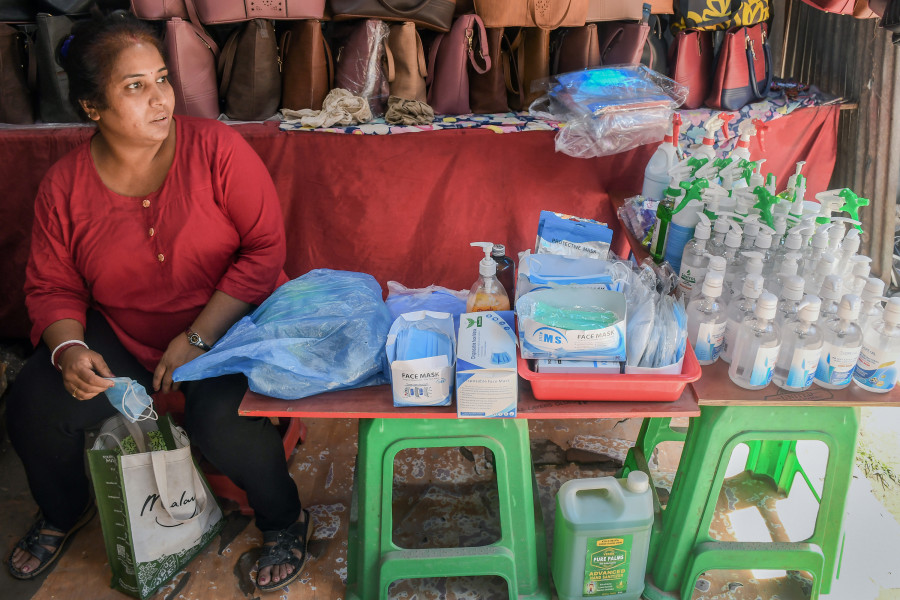Money
Sales of masks and sanitisers drop as people become more carefree
The pandemic is not over yet, and people should take precautions even if they have been vaccinated, health experts say.
Krishana Prasain
Kamal Lama commutes to work daily by bus, and is terrified that he might catch the coronavirus because he sees so few of his fellow passengers wearing masks. Even during rush hour, when the bus becomes quite crowded, most travellers are barefaced.
“When you are walking around a public place and see all those people who don't seem to care that there is a pandemic going on, it's hard to believe that we confined ourselves to our homes for four-five months not to get infected. Now it looks like everything is fine,” said Lama.
The 34-year-old from Maharajgunj says he always wears a mask, and never forgets to carry a sanitiser in his bag.
Lama’s observation is true. Sales of face masks and sanitisers have dropped sharply—by more than half—since January, according to retailers and manufacturers.
The Post talked to several manufacturers of face masks and sanitisers who reported that sales had nosedived, and accordingly, their production too. This shows that people are not wearing masks or using sanitisers, particularly in urban areas outside Kathmandu, according to retailers.
If the carefree tendency continues, there could be a public health catastrophe, said doctors.
Entrepreneurs who invested in mask and sanitiser factories expecting to reap a bonanza with Covid-19 spreading rampantly are on the verge of collapse.
Rex Ranjitkar, marketing officer of Himgiri Hygiene that produces different hygiene products under the brand name Aura, said that mask sales had plunged by 50 percent mainly due to people taking the virus issue lightly after all public places were allowed to open.
Political demonstrations and counter-demonstrations have been erupting across Nepal with the two factions of the Nepal Communist Party engaging in shouting matches following the premature dissolution of Parliament by Prime Minister Oli on December 20.
The country is still fighting the Covid-19 pandemic, and officials have been tirelessly issuing guidelines to maintain social distancing and wear a mask. But these safety precautions were thrown to the winds by the marchers at the political rallies in the Kathmandu Valley.
On Tuesday, the Supreme Court overturned Oli's decision to dissolve the House of Representatives, setting off another round of street marches.
“People are living under a false perception. They are confident that the virus caseload has dropped,” said Ranjitkar. “But the risk has not gone away.”
Health experts and doctors say the pandemic is not over yet, and people should wear masks and use sanitisers even if they have been vaccinated.
Dr Baburam Marasini, former director at the Epidemiology and Disease Control Division at the Department of Health Services, said the government was not working hard enough to create awareness among the general public.
“People are interpreting the disease and the risks on their own,” he said. “This will have a negative impact on public health.”
Himgiri Hygiene introduced the Aura brand mask after the virus outbreak, and it had just launched the Aura brand sanitiser when the pandemic hit.
Sabindra Byanjankar, sales manager at Bhat Bhateni Supermarket in Tripureshwor, said that sales of masks and sanitisers had shrunk by more than 40 percent. “It seems that people are not wearing masks nowadays,” he said.
Byanjankar said that the number of domestic companies producing masks and sanitisers had also increased after the pandemic as stores are selling mostly local production.
The price of imported hand sanitisers has increased slightly, but the price of locally made masks and sanitisers is stable, he said. Stores sell more local sanitisers than imported products, he added.
With the decline in demand and sales of masks and sanitisers, it will be hard for the firms that opened to cash in on the pandemic, Ranjitkar said.
“We offer diverse personal hygiene and home care products like wet wipe, bathing soap, laundry soap, detergent powder, dish wash soap, surface cleaner and disinfectant, among others, and the decline in sales of masks and sanitisers will not hit our revenue much,” he said.
Byanjankar expects sales to drop further as people become more relaxed because they know that vaccines are available, and gradually forget to wear masks and use sanitisers.
Traders say that as the vaccines have started arriving and people are being vaccinated, sales of masks and sanitisers will continue to decline in the coming days.
Retailers and manufacturers said that what little demand for masks and sanitisers exists is because they are still mandatory in a few public places, otherwise sales would have plunged to pre-pandemic levels.
Demand for hand sanitisers had jumped by more than 80 percent last February, with pharmacies and supermarkets instantly running out of stock.
According to the Department of Customs, Nepal imported face masks valued at Rs515.93 million and sanitisers and other disinfectants worth Rs766.33 million in the first seven months of the current fiscal year.
On Tuesday, 94 new cases were recorded in the country and there was one Covid-19 related fatality, pushing the death toll to 2,066. The overall infection tally has reached 273,760 with 1,555 active cases.
According to the Ministry of Health and Population, 270,139 infected people have recovered from the disease so far, 71 of them in the past 24 hours.




 13.12°C Kathmandu
13.12°C Kathmandu













